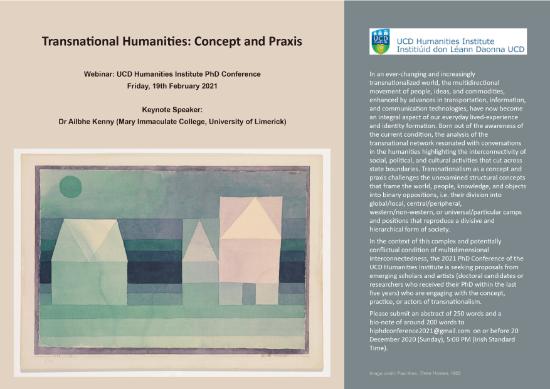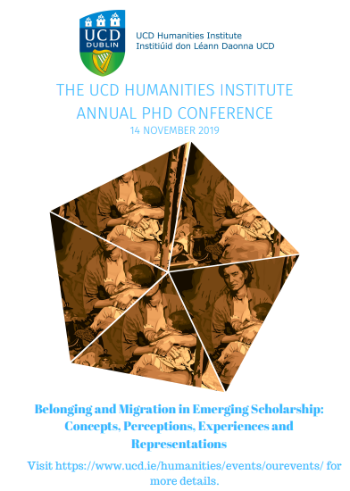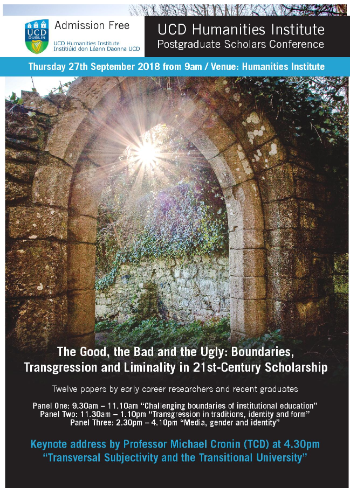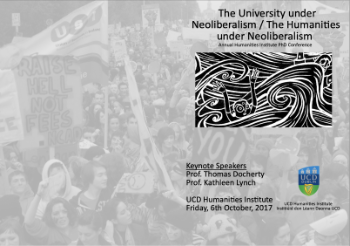Thresholds: Contexts of Rupture, Change and Adaptation
Friday, 25 March 2022, UCD O’Brien Centre, Theatre E, and Online
Listen to Conference podcasts (opens in a new window)HERE
-350x495.jpeg)
Programme
09:00 Welcome
Prof. Anne Fuchs (Director and Professor, UCD Humanities Institute)
09:10 Panel 1: Digital Thresholds & Methods
Holly Parker (University of Lincoln): Escape from The Stacks: Negotiating Affective Membranes and Virtual Reality in Ernest Cline’s Ready Player One
Cáit Murphy (Trinity College Dublin): The Somatic Thresholds of Palestinian Activist Videos on Instagram
Orla Delaney (University of Cambridge): Data encounters: towards a theory of databasing in the museum
Fatma Kirwan (FHNW Academy of Art and Design/ Justus Liebig University Giessen): Through the Threshold: Responsive, performative and self-referential
10:40 Tea/Coffee Break
11:00 Panel 2: Historical Breaks: Befores and Afters
Noble Shrivastava (Jawaharlal Nehru University): Tradition and Transition: Courtesans and the Early Colonial State in 19th Century Delhi
Viktoriia Grivina (University of St Andrews): The 4th Block Triennial of Eco Poster and Dealing with The Trauma of Chernobyl In Ukrainian Graphic Design
Jacob Miller (University College Dublin): The First Rule of Brexit is Don’t Talk about Brexit: “Liberal Nationalism” in Ali Smith’s Seasonal Quartet
Luke Watson (University College Cork): A Break From the Past: Adapting and Reacting to the French Revolution in Ireland, 1789-1798
12:30 Lunch
13:30 Panel 3: Identities in Flux
Fernando Alejandro Remache-Vinueza (University of Glasgow): Changes and interactions between the mainstream narrative and alternative identities: The case of Lithuania
Esha Nadkarni (Goa University): Probing the Transformation of Devadasis in The Undoing Dance
Yanli Xie (University College Dublin): Finding a place for the ‘modern/new’ Chinese women in Republican domestic kitchens: gender norms and the cooking-related writings published in the 1920s to 1930s
Monja Stahlberger (Institute of Modern Languages Research, University of London): Overcoming Everyday Constraints: Agency and Identity in Diaries of Child Refugees from National Socialist German
Sarah Tierney (Swansea University): Exploring societal ambivalence: The experiences of Refugee Women seeking Sanctuary in Wales
15:15 Tea/Coffee Break
15:45 Panel 4: Artistic Responses to Thresholds
Anton Pereira Rodriguez (Ghent University/University of Verona): Between Modernism and Postmodernism: Jan Vercruysse’s questioning of a place for art
Hattie Idle (University College Dublin): “On the Outside Looking in”: Romantic comedy, awkward (sub)urban aesthetics, and US-Aotearoan encounters in Taika Waititi’s Eagle vs Shark (2007)
Rory Clarkson (Durham University): Travelling through grief; elegy crossing thresholds in “Sailing Home from Rapallo” and “A Procession at Candlemas”
Annemarie Iker (Princeton University): Can an artwork keep a secret?
17:15 Keynote
(opens in a new window)Prof Caroline Bassett (Professor of Digital Humanities, Faculty of English, University of Cambridge & Director of Cambridge Digital Humanities):
The Light Under the Door: Technologies and the End of Worlds (Now available as a(opens in a new window) Podcast).
18:30 Close
This event is funded by the UCD Humanities Institute (HI).
The HI was established in 2002 and has become a working home for hundreds of postgraduate, postdoctoral and visiting scholars. It forms a key component within UCD’s strategic mission to develop as a leading global research intensive university, and constitutes a vibrant and creative space for interdisciplinary research in the arts and humanities.
**********************************************************************************************
Thresholds: Contexts of Rupture, Change and Adaptation
CALL FOR PAPERS
Keynote Speaker:(opens in a new window) Professor Caroline Bassett, University of Cambridge, Faculty of English, Director of Cambridge Digital Humanities
The changes brought about by the COVID-19 pandemic have been so radical and extensive that the concept of ‘back to normal’ has evolved into that of a ‘new normal’ in recognition of the fact that there can be no return, only new forms of existence in a new world. This sense of a before and after, and the processes of rupture, change, adaptation, translation and transformation that it entails, are what we seek to critically and creatively engage with through the symbolic vehicle of the threshold. We understand thresholds as representing the movement from one space or state to another, whether this be sudden and cataclysmic or slow and gentle. The ‘threshold’ also allows for an exploration of ‘in-between’ or ‘in process’, i.e. that which is located on or within the threshold, rather than on either side of it. We may be forced to move through a threshold, adapting as best we can to the circumstances on the other side, or we might produce a threshold as part of a process of creativity and discovery. Translators, for example, work within a linguistic threshold, forging something new from a pre-existing piece of textual or verbal expression.
In the context of a world defined by change and flux, nevermore so than in the last eighteen months, the 2022 PhD Conference of the UCD Humanities Institute is seeking proposals from emerging scholars and artists (doctoral candidates or researchers who received their PhD within the last five years) who are engaged, either conceptually or practically, with thresholds of any kind.
We invite proposals for individual papers from the fields of literature, philosophy, history, classics, archaeology, art history and other humanities disciplines suitable for a 15-minute presentation, or 3-paper panel sessions addressing topics that include but not limited to:
- Thresholds of technological, social or political change
- Geographical, political, cultural or religious thresholds as places of division and encounter
- Instances of failed or thwarted attempts at adaptation
- Advantages, disadvantages, and complexities of change, translation, and transformation
- Thresholds between media and within the digital humanities
- Experience of ambivalent agency and liminal identity in migration, diaspora labour exportation, and refugee issues
- Social constraints and the overcoming of imposed limits against thresholds of race, gender, ability, age, or class identity
- Interrogating and problematising thresholds of gender and gender binaries
- Challenges and possibilities of linguistic and cultural translation
- The translation or adaptation of material for new audiences in art, literature, music, film, computer games, and other media
- Transformation and adaptation as a process of preservation
- Transformation between media and genre and the “going through” multiple thresholds; multiple levels or phases of change, adaptation and transformation
- Questions of the exaltation (or not) of the “original” versus the “copy”
- Hierarchies of adaptation. In what context do stories get “reborn”? Why are some stories retold more often than others?
- Gains and losses in the transformation from one medium to another
- Representations of ‘thresholds’ in social discourses in literature, art, film computer games, and other media
Please submit an abstract of 250 words and a bio-note of around 200 words to hiphdconference2022@gmail.com on or before Tuesday, 15 February 2022, 5:00 PM (Irish Standard Time). All proposals should include your name, email address and academic affiliation (if applicable). Please also include a main subject field plus secondary subject field in the application.
The conference will be held in English. The conference is convened by Resident Scholars of the UCD Humanities Institute. Exceptional papers may be recommended for publication in the blog ((opens in a new window)https://tnhphd.network/) or other venues.
This is a hybrid online and in person conference. We welcome applications from anywhere in the world. Successful applicants who are unable to travel to Dublin for the conference will be invited to present online. There will be a live stream of all presentations available for all registered attendees. We are also aware that due to the pandemic, it may become inadvisable to hold an in-person conference; in case of changes to government restrictions or UCD policy regarding in-person events, this conference will be moved online.
For further information contact HI Resident Scholars Louisa Carroll, Lauren Cassidy, Suchismita Dattagupta, Prolet Decheva, Clare Kelly, Annie Khabaza, and Maika Nguyen, at the above email address.
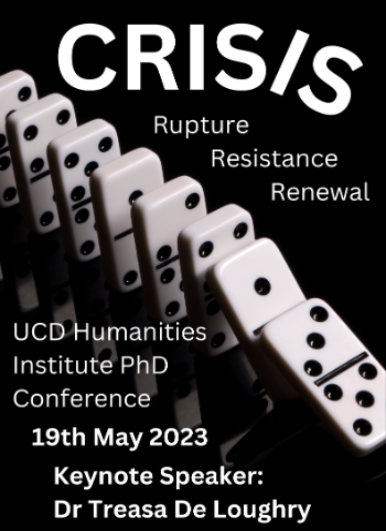
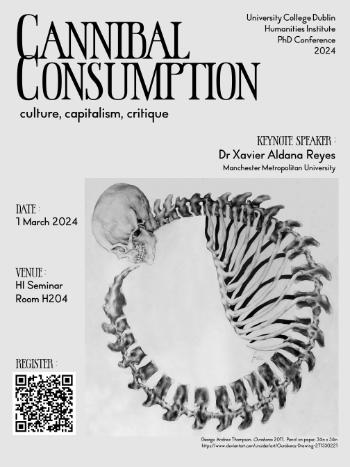
-350x495.jpeg)
